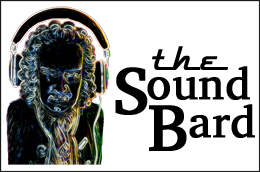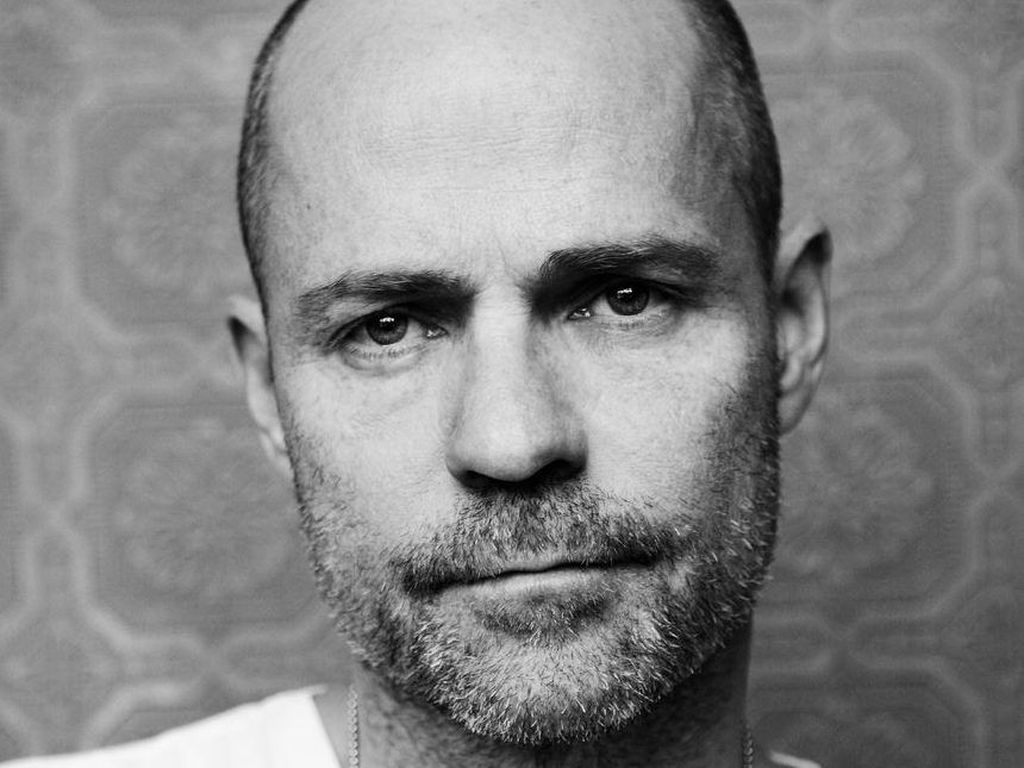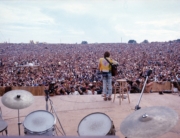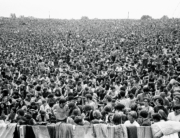BY MIKE METTLER — DECEMBER 31, 2020
The late, fully completely great singer/songwriter/poetic auteur Gord Downie made so much beautiful, heartfelt music over his tragically cut-short career — music that continues to personally impact my daily listening life in so many cherished and deeply soul-rooted ways. So, in the midst of navigating the most challenging and unsettling year of 2020, being able to hear a collection of ten previously unreleased new songs from brother Gord, an artist whom I was honored to also call a good friend, has truly been a profound and treasured aural gift from the great beyond.
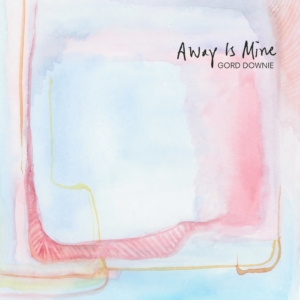
Indeed, the ten tracks that comprise Downie’s final solo release, Away Is Mine (Arts & Crafts), whisk the listener headlong into a most magical, mystical, minimalist journey through Gord’s innermost thoughts as captured in the studio near the literal end of his life, seeing as they were all cut across four days at his band The Tragically Hip’s Bathouse studio in Bath, Ontario, in July 2017, just three short months before his untimely passing from glioblastoma that October.
Each Mine song is purely and perfectly delineated via sparse, supportive arrangements courtesy Gord’s chief collaborators, acoustic guitarist/bassist Josh Finlayson and in-sympatico producer/mixer/engineer Nyles Spencer. From the despairing swagger of “Useless Nights” to the echo-drenched too-self-aware mantra of “The Least Impossible” to the sweet sayonara serenade of the final track, the oh-so-aptly titled “Untitled,” Mine is all manna, made all the more special by the decision to include the acoustic versions of each song on a second disc (or second LP, if you choose to enjoy the album on wax — which you should). These are but a few of the many, myriad reasons why Away Is Mine is my personal, clear-cut choice as being the No. 1 Album of 2020.
“He was looking to be inspired, and he was looking to inspire. That was part of the collaboration process with Gord,” Finlayson (who played on and off with Gord in his solo-band collectives for about 15 years) told me of the Mine sessions. Added Gord’s youngest brother and the album’s executive producer, Patrick Downie, “What will maybe become part of Gord’s musical legacy is that he was very agile, as he would say, or very chameleon-like in that he could sing many different styles of songs. Who knows what we would have seen from him in the future?” (Who knows, indeed. . .)
I got on a conference call that connected me across the border to the north with Downie and Finlayson in Ontario to discuss the makings of Mine, how growing up in a big family may have influenced Gord’s inimitable onstage persona, and what their personal favorite Gord lyrics are. (You’ll find out which GD lyric is my favorite as well.) No one says goodbye anymore / for fear that’ll be goodbye. . .
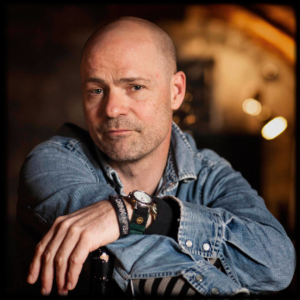
Mike Mettler: Away Is Mine is such a beautiful gift. Did you know that October 2020 would be the timeframe for this release a while back? Or was it more like a natural sense of, “This is when we need to get this album out to everybody”?
Patrick Downie: Well, given the circumstances, and just even the time of the first year or so after Gord passed, there were a lot of decisions to be made. A lot of tributes and things were pouring in, in terms of all the ways in which people wanted to honor Gord. And, really, a lot of those decisions were hard to make — there are the ones you have to make, but they are hard to make “under the haze of sorrow,” as Adam Cohen told me. I talked to him after afterwards, and that’s his line.
[The SoundBard notes: Acclaimed Canadian singer/songwriter Adam Cohen is the son of the late, legendary Canadian singer/songwriter/poet Leonard Cohen, who passed away in November 2016 at age 82.]
Mettler: That’s such a great line.
Downie: (chuckles) That is a line I’ve used a lot, but not always footnoted. But anyway. Really, the thing we had to rely on was that, like many things with this project, it seems to be divinely guided. And, you know, timing is not something you can control. But once time had passed, and Josh and I had spent a lot of time and a lot of hours talking about it — talking about Gord, and sharing memories of Gord — the timing presented itself. And, like so many other things, as I’ve said with this record and things with Gord, you just have to be present and open, and trust in the same things he would.
Mettler: Yeah. I also like that Away Is Mine has a minimalist approach to it, and we have both the proper record and the acoustic record in this package. Josh, I know you say in the liner notes that it was kind of a “selfish decision,” but I say it’s kind of an unselfish decision to share those acoustic versions and demos with us like you did.
Josh Finlayson: I think the initial ask was kind of like, “I wanna selfie with Gord.” (Patrick laughs heartily)
Mettler: (laughs) Yeah, right — an “audio selfie,” we can call it.
Finlayson: (chuckles) Oh yeah! But I think part of it was just, we had written these songs. I recorded the ideas on the phone, sent them to Gord, and he sent them back. Then I went over to where Gord and Patrick were living. We recorded them [the acoustic versions/demos] in the dining room with my stuff from my phone, and him on a laptop. I just really wanted a great representation of that. Nyles Spencer, who produced the record and recorded it, engineered it, and mixed it, was on top of it, so I knew it was gonna sound great. I knew it did sound great, so initially, I just wanted that acoustic stuff for me. I wanted to hear it that way.
Then it became apparent it was such a great insight into Gord’s process of writing. I think that’s one thing where, as Patrick referred to as we talked a lot about Gord, you talk about an artist of his stature, and his legacy — legacy ultimately finds its own path. And Gord’s legacy, even just in the last few years of his life, was catapulted into another sphere — certainly in this country [i.e., Canada], but I think around the world. It’s hard not to be moved by his story arc.
I think the opportunity to give some insight into Gord’s creative process, artistic process, and collaborative process is opportunity for people — even if this is the first record someone gets insight into — to find there’s such an immense body of Gord’s work to discover.
Mettler: That’s such a good point because, as you know, I’m down in the States, and I can’t count the number of times people have said to me, “I can’t believe I missed out on seeing Gord and The Hip, or just listening to his music, and their music.” People are now just discovering things we knew were there all along. It’s an irony, if that’s the correct usage of the word, that people have discovered the heritage of his great body of work you guys are now adding even more to — a great body of work you guys are curating so well.
Finlayson: Well, thank you.
Downie: Yeah, thank you. You know, as Josh likes to say, being Gord Downie wasn’t always an easy thing. It came with some responsibility and expectation, and the same goes for his legacy. So, in terms of this record and his legacy overall, it requires the right curation and reverence and the same kind of humility, or whatever Gord would put into it. And we rely on a lot of those principles and things — instincts he honed over the years that have been hugely helpful in doing all this.
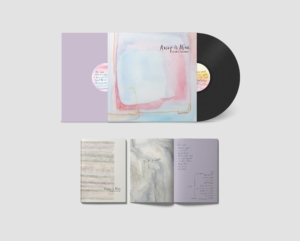
Mettler: Yeah, it’s really something. In terms of the record sequencing, was that a natural thing? Josh, did you and Gord have any discussions about that, or is it just an organic thing that felt right to you?
Finlayson: The songs were written, recorded, and sequenced in the order they appear. From track 1 to 10, that’s how they were written. That’s how we recorded them, and that’s the sequence of the record. And that was an easy decision. (chuckles)
Mettler: I hope people take to it in that order — where you go 1 to 10, and then you go to the acoustic disc and just kind of flow back into the main disc again. That way, whenever you get to lines like, “When I get high / I get conservative” — which are the opening lines of the title track — they’ll hit you in a different way, depending on what day of the week you’re living in when you listen to it.
Downie: Yeah. Well, when Josh and I were listening to the mixes, we really didn’t delve into too much of Gord’s — everything was sort of preserved as it was left. We were careful to crack open his file folders, so to speak — you know, his working files — and we really got attached to how they appeared as “Song 1” and “Song 2.” That’s how Gord had listed them. We weren’t even sure we had song titles, but that was a beautiful find, including that the last song was left untitled. [Track 10 is literally named “Untitled.”]
Mettler: It’s super-fitting, too, because you could have gone with the “Good Night” line or something like it as the title, but leaving it “Untitled” really fits the bill.
Downie: Well, with the whole thing, we really take the same kind of care or careful consideration as Gord would. Taking any kind of license with his material just never felt right. Even the album title itself — there were a number of incarnations. We had a working title for the band that was maybe going to be the album title — as in, GD and The Family Band. And then, over time, we found this really beautiful title that seemed to come from somewhere else. The Away Is Mine title just basically presented itself, and it just seemed too perfect, and too appropriate, to pass up. That’s really the only license we took with Gord’s words.
Mettler: Yeah. I’m calling it the “spirits in the ethereal world” kind of title, because I like what it evokes, in so many ways. I would also say I feel like there are some ’80s touches with some of the production on the album. Is that a fair assessment, Josh?
Downie: (interjects) Did you say “acid,” or ’80s? (all laugh)
Mettler: I was saying ’80s, but I could see some acid being involved, if that’s also part of it. (more laughter all around)
Finlayson: Um, neither are correct. (chuckles) The production is very much Nyles, and it’s all his imagination and his instinct. I think he did an incredible job, taking the songs as they were and turning them into what they became. Gord implicitly trusted Nyles and his instincts, and Gord is such a great collaborator. He did not hover over — and this is my experience — he did not dictate what people could or couldn’t do. He was very much the opposite. He would give you the reins, and you’d run with them. And that was a real gift for anyone who had the opportunity to work with him in that way.
Mettler: Yeah, I often saw it as he was a reactant to whoever he was working with — that things would just springboard off whatever relationship you and he had as the artists with each other, and that made whatever the bed or the demo was even better. You just became one with the piece, and made it bigger than what it started as.
Finlayson: That was very much my experience with him, you know? He was looking to be inspired, and he was looking to inspire. That was part of the collaboration, I think, with Gord — and with an audience as well. I think if there was any expectation from my perspective, it was only that you need to be present in the moment as a performer, and certainly in the recording studio.
Downie: What will maybe become part of Gord’s musical legacy is that he was very agile, as he would say, or very chameleon-like in that he could sing many different styles of songs. And when you talk about his punk influences — that, to me, over time, is really something Gord comes back to, in showing his earliest influences. Who knows what we would have seen from him in the future?
I would have loved to have seen him get into the rap game just a little bit. I know that Gord liked breaking the rules like a lot of rappers do, and like a lot of punk rockers do. It’s not about the conventions or how good you are, like Josh was saying. It’s about just doing it, and being in the moment, and going for it. That sensibility really, really was a big part of his ethos.
Mettler: I would say his verbal improvs, or whatever you wanna call them, are kind of his rap sections. He would just sing and/or say, for however long it would last, phrases that were coming to him literally in the moment. And when you saw a number of shows in a row, you could see the evolution of his process: “Oh, I got this idea, and I’m going to work it out right in front of people each night,” but also like it didn’t exist before this moment. I have notebooks where I was writing a lot of this stuff down, and sometimes after shows he’d ask me, “Was that a good one?” And I’d be like, “I like this line! I don’t know where it’s going, but I like it.” And then you’d see it show up in a song like five years later. (Patrick chuckles heartily) Is that something you knew Gord could do growing up, Patrick? Did you recognize he was a grand improviser in that fashion?
Downie: Well, we were a big family, and everybody was always trying to out-funny somebody else (MM laughs), so the hambone part of it is probably something he came by pretty honestly. But I have to say, it’s like what Josh often talks about as far as Gord as a performer. It may not have appeared this way, but he had so much focus and he put so much preparation into anything he was doing — performing included — only to allow himself that freedom and that fearlessness to get out there and just do that kind of confluence-style free-form rap, or whatever you want to call it. That was all his preparation.
If you were ever to see him on “Game Day,” so to speak, it wasn’t a great hang, because he was slowly and quietly preparing to get up and do his thing for about two hours that night. Anyway, like I said, that preparation and focus gave him that freedom, and that’s what came out.
Mettler: I totally agree with all of that. Alright, now here’s the million-dollar question of sorts. I don’t know if it’s easy to quantify, but, for each of you, do you have a particularly favorite Gord line? Like, just one line, any song, from any part of his life, that’s your personal favorite line he ever wrote or sang? If you could grab just one, that is.
Finlayson: If it’s for a million dollars, do we have to split the million? (Patrick laughs)
Mettler: (laughs) That’s a fair question. Well, depending on whose currency is higher right now, we’ll take the better exchange rate.
Finlayson: (laughs) Ok, yeah! Patrick, you go ahead first.
Downie: Uh, he had a lot of lines, you know? He borrowed a lot of lines and he quoted a lot, but it’s just such a joy to repeat those lines whenever you can. There are so many, and I don’t have necessarily favorites, but if we’re talking about this record and this context, I have to say, “I’m only as happy as my least happy kid” [from “Useless Nights”]. I mean, they just go on forever.
And Joshie — he’s got a great memory for that stuff, and he loves to throw out the Gordie lines whenever he can. It’s funny.
Finlayson: You know, I have so many memories too, from working on Coke Machine Glow [Downie’s first solo album that was released in July 2001] and sometimes just being there, you’d know where the origin of a line came from, or he would talk about it.
But, specific to this record, there’s lots I could choose, but the one I think of often and one that always puts a smile on my face is, “When I get high / I get conservative” [from the opening of the aforementioned title track, “Away Is Mine”]. That line just puts a smile on my face, because it’s like the classic stoner line. (all laugh) You get into it to sort of escape, and then it becomes its own sort of prison. It’s a classic way of describing that kind of stuff, and he had this way of distilling it — and often, he could do it in a humorous way too.
It’s one of the things I do like about this record — that there is humor in it, and Gord had such a great sense of humor. I know that was such a big bond between him and I, just to be able to laugh. And I share that with Patrick too, and his family, and his kids. I don’t know if it’s a DNA thing or just a shorthand that, once you have it with friends, it’ll never go away.
Mettler: Yeah — you’re a “family band,” as the song goes. [This is a reference to “Family Band,” a track from The Tragically Hip’s October 2006 album, World Container.]
Downie: That does sum up Gord, yeah. Just like he was always “as happy as my least happy kid,” and that’s pretty much the truth — and that goes across the board with almost everybody who are all his friends and loved ones. He was always very concerned with how everybody was doing.
Mettler: Yeah, oh yeah, that’s true. He would always ask you about those personal things. Being a selfless person is not easy to do in a position where people put you on a pedestal, but his humanity always seemed to come across regardless of all that stuff. Now, my personal favorite line of Gord’s is, “We live to survive our paradoxes” [from “Springtime in Vienna,” a key track on The Tragically Hip’s May 1996 album, Trouble at the Henhouse]. I think that’s one of the best-written lines of the last century — and I’ll say that to anybody.
Downie: (chuckles) I love that.
Mettler: In terms of the humor aspect, every time I see a Tim Hortons commercial, I will often think to myself, “Well, it’s very important.” Those commercials always make me think of that “Vancouver Divorce” line [“Sitting here at the Hortons / So you know this is important” — a line from the second track on Coke Machine Glow]. (more laughter)
And I also think your point is good — there’s a sense of humor there that sometimes I think people don’t realize enough. I also love the line, “I have a bird’s eye view of a bird’s eye view” [from “The Bastard,” from The Tragically Hip’s June 2000 album, Music @ Work]. Endlessly great lines of his to conjure up.
Finlayson: I also like, “Escape is at hand for the travellin’ man.” That’s a great line too.
[The SoundBard agrees: Indeed it is, as it’s a key line and also the full title of a song from The Tragically Hip’s July 1998 album, Phantom Power.]
Mettler: Oh yeah — and there’s a lot of great humor in that song too, come to think of it.
Finlayson: Oh yeah, yeah. For sure. I know for me, it’s been a great way to think about Gord too. I often find myself, when I’m even just talking to Patrick, I’ll think of a story or a line of his, and I’ll share it. It’s a good way to remember him.
Downie: Yeah. Yeah, I think so too.
Mettler: Me three. And I’m glad we got Away Is Mine on vinyl, by the way. I’m not sure who’s specifically curating this, but we’re seeing photos of Gord’s vinyl collection on Twitter and his other social media places. Who decided to do that, Patrick? Is that something from you? How did that come about?
Downie: Again, it’s not necessarily an easy thing, but we know Gord, in terms of sharing his world — I think he would share anything about his loves and his passions, and things like that, and we wanted to be able to give people a little bit of a snapshot into his Wes Anderson world. (MM laughs) He had so many things I think are so interesting to people, including his taste and influences, so we tried to just present it, and not be too precious about it. We feel like there are a lot of people who really appreciate it — especially his book collection and his record collection, and whatever we can show from his bookshelves.

Mettler: Yeah, the books are fantastic too! But whenever I see some of the records being shown, I wonder, do you find that any of them were once yours that you thought were lost? Like, “Oh, I always wondered where that album went to”?
Downie: There’s a couple! (MM chuckles) There were a couple. I saw some gifts, and I saw a few of my sister’s records too (laughs heartily) — which he would, of course, label.
We really just like to put it out on social media, and let other people connect the dots, you know? Gord had a lot of evolving favorites over time, so we don’t want to put any definitive sort of claims to any of this stuff too much, other than it was always within arm’s reach.
Mettler: Sure. Was there a first record when you all were growing up that you’d say is kind of like the “community” record — as in, everybody in the house loved a specific album? Did anything ever happen like that when you guys were growing up?
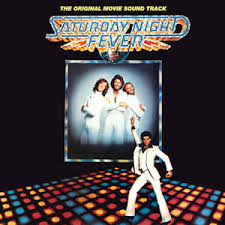
Downie: There are records that were in very high rotation, and ones that maybe, of course, your mother would tell you to turn off, or whatever. (MM chuckles) For the most part, in our family, there were no musicians per se, but music was a big part of our fun. And we had big dancers, more than singers. But I would say [November 1977’s] Saturday Night Fever was one of those big albums. I was the youngest, so it was probably something that covered all the bases. It got a lot of play, and it got everybody up and dancing.
Mettler: We all had that record in our collections growing up — that one, and [April 1978’s] Grease, are the ones we all had, back in those days.
Downie: We had to hide that one, for a long time. (laughter all around)
Mettler: Now it seems to be ok to actually say, “Yeah, we had that one. We’re allowed.” Josh, how about you? Growing up, what was the first vinyl record for you that was really important to you as a kid?
Finlayson: Well, my dad was a big record collector, and he had a real diverse record collection. I’m the youngest of three — my oldest brother’s a classical guitarist, and my middle brother played classical piano — and my dad had a Chet Atkins record he would’ve bought in the mid-’60s. He had a couple of Chet Atkins records, and those were records I remember very distinctly him listening to when I was growing up.
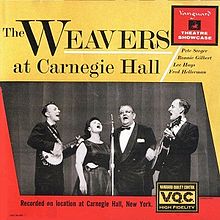
There was just so much music he loved. He had the Preservation Hall Jazz Band, and lots of classical stuff — oh, I know a record I remember! It was The Weavers at Carnegie Hall [released in April 1957]. That was another record I grew up with. There was a lot of diverse music we all played in our house.
Like I said, I have two older brothers who played music. My mom played piano, and my dad kinda played ukulele a bit, but he just loved music. And I thought, “If my brothers can play music, then anybody can play music.” I had this very brazen attitude about music. I didn’t even think you had to be good — I just thought you had to sort of do it, and it was good just because you’re doing it, you know? That was my attitude.
So, I think for both Gord and I getting into music when we did, it was obviously post-disco into the punk era of music, and it was also DIY. It was like, to be a real musician was almost a crime, you know? (chuckles) It was better to not know music then, and sort of make it up as you go. I know that was very much common ground for him and I.
Mettler: I can totally see that throughline. Is vinyl the best way to hear Away Is Mine? It’s such an atmospheric record, and since we were talking about the production style and just the sense of how it sounds, dropping a needle on it really seems to be the best way to get the total music experience with it.
Finlayson: The vinyl sounds amazing. Yeah, it really does. It runs at 45 RPM, and because it’s open-tuning in C, it’s quite low. And honestly, the way it sounds on vinyl — it’s killer! Eric Boulanger did a great job mastering the vinyl.
Downie: We got to listen to the vinyl for the first time at Josh’s house, so to hear the mix between songs — even, you know, the way Nyles did all the transitions — was just great. And like Josh was saying about the sonics — we hadn’t heard some of that stuff since the mastering. It was just like, “Oh my God, there’s so much in here that I hadn’t been able to hear.” And, wow — what a joy that was to hear it all again.
Mettler: I do love hearing it all on vinyl, I must admit. To wrap things up, is there anything in the future — even if you can’t specify what they are exactly — other things from the vaults that are coming, either Hip-wise or Gord solo-wise?
Downie: Um, yeah! There’s loads of stuff. The archives are, basically, just being opened up now. There’s been so many discoveries of forgotten songs, and even material that Gord, solo-wise, had worked on over a ten-year span. You know, he worked a lot. He always seemed to have his list of muses, and people who he really just enjoyed the process of working with. So, yeah, there’s loads of stuff. It’s just a matter of figuring out the timing, and making sure every different project gets its day.

